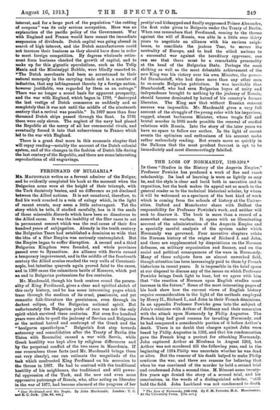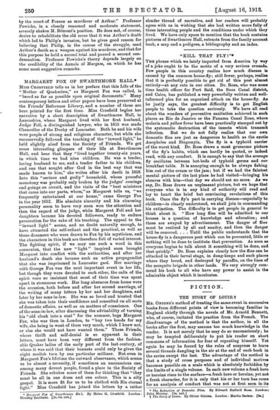THE LOSS OF NORMANDY, 1189-1204.*
IN these "Studies in the History of the Angevin Empire," Professor Powicke has produced a work of fine and exact scholarship: Its load of learning is worn as lightly as may be, and the style is clear and lucid both in narrative and in exposition, but the book makes its appeal not so much to the general reader as to the technical historical scholar, by whom it will be welcomed as a specimen of the best kind of work which is coming from the schools of history at the Univer- sities. Oxford and Manchester share with Belfast the responsibility for Professor Powicke's work, and neither will seek to disavow it. The book is more than a record of a somewhat obscure warfare. It opens with an illuminating account of the administration of the Angevin Empire and a specially careful analysis of the system under which Normandy was governed. Four narrative chapters relate the Norman history of the reigns of Richard I. and John, and these are supplemented by disquisitions on the Norman defences, on military organization and finance, and on the social and political consequences of the wars in Normandy. Many of these subjects form an almost unworked field, though attention has been increasingly paid to them by French historians in recent years. It is impossible in the brief space at our disposal to discuss any of the issues on which Professor Powicke brings fresh light to bear, but we agree with him that "the reaction of Norman upon English studies must increase in the future." Some of the most interesting pages of his book show how the current views of English history require reconsideration in the light of the methods employed by Henry II., Richard I., and John in their French ddminions. In an appendix Professor Powicke goes into the subject of John's relations with Arthur of Brittany and their connexion with the attack upon Normandy by Philip Augustus. The French king had good reasons for invading Normandy, and he had conquered a considerable portion of it before Arthur's death. There is no doubt that charges against John were heard by Philip Augustus in 1202, and that his condemnation gave the French king a pretext for attacking Normandy. John captured Arthur at Mirebeau in August 1202, but Arthur was not murdered till the following year, and in the beginning of 1204 Philip was uncertain whether he was dead or alive. But the rumour of his death helped to make Philip continue the war, and there are reasons for believing that when he was convinced of the murder he held a second trial and condemned John a second time. M. Bemont some twenty- five years ago denied the story of a second trial, and his conclusions, in the words of a distinguished scholar, "still hold the field. John Lackland was not condemned to death • The Loss of Normandy, 11894201. By F. M. Powicke, M.A. Blanchester: At the University Press. [15s. net.]
by the court of France as murderer of Arthur." Professor Powicke, in a closely reasoned and moderate statement, severely shakes M. Bemont's position. He does not, of course, desire to rehabilitate the old error that it was Arthur's death which led to Philip's invasion, but he gives good reason for believing that Philip, in the course of the struggle, used Arthur's death as a weapon against his murderer, and that for this purpose he held a second trial and passed a second con- demnation. Professor Powicke's theory depends largely on the credibility of the Annals of Margam, on which he has some most suggestive remarks.



































 Previous page
Previous page